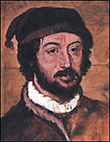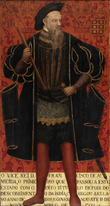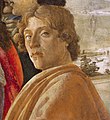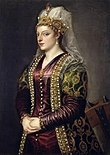1510
| Millennium: | 2nd millennium |
|---|---|
| Centuries: | |
| Decades: | |
| Years: |

| 1510 by topic |
|---|
| Arts and science |
| Leaders |
| Birth and death categories |
| Births – Deaths |
| Establishments and disestablishments categories |
| Establishments – Disestablishments |
| Works category |
| Gregorian calendar | 1510 MDX |
| Ab urbe condita | 2263 |
| Armenian calendar | 959 ԹՎ ՋԾԹ |
| Assyrian calendar | 6260 |
| Balinese saka calendar | 1431–1432 |
| Bengali calendar | 916–917 |
| Berber calendar | 2460 |
| English Regnal year | 1 Hen. 8 – 2 Hen. 8 |
| Buddhist calendar | 2054 |
| Burmese calendar | 872 |
| Byzantine calendar | 7018–7019 |
| Chinese calendar | 己巳年 (Earth Snake) 4207 or 4000 — to — 庚午年 (Metal Horse) 4208 or 4001 |
| Coptic calendar | 1226–1227 |
| Discordian calendar | 2676 |
| Ethiopian calendar | 1502–1503 |
| Hebrew calendar | 5270–5271 |
| Hindu calendars | |
| - Vikram Samvat | 1566–1567 |
| - Shaka Samvat | 1431–1432 |
| - Kali Yuga | 4610–4611 |
| Holocene calendar | 11510 |
| Igbo calendar | 510–511 |
| Iranian calendar | 888–889 |
| Islamic calendar | 915–916 |
| Japanese calendar | Eishō 7 (永正7年) |
| Javanese calendar | 1427–1428 |
| Julian calendar | 1510 MDX |
| Korean calendar | 3843 |
| Minguo calendar | 402 before ROC 民前402年 |
| Nanakshahi calendar | 42 |
| Thai solar calendar | 2052–2053 |
| Tibetan calendar | 阴土蛇年 (female Earth-Snake) 1636 or 1255 or 483 — to — 阳金马年 (male Iron-Horse) 1637 or 1256 or 484 |

Year 1510 (MDX) was a common year starting on Tuesday of the Julian calendar.
Events

January–March
- January 23 – An 18-year-old Henry VIII of England jousts anonymously at Richmond, Surrey and draws applause, before revealing his identity.[1][2]
- January 29 – The Mary Rose ship is laid out.[3] The next year the ship is launched on July 29, 1511, and is afterwards towed to London to be fitted, and is finally completed in 1512.[4] In 1545, during the Battle of the Solent, she sank.[5]: 2 The reason for her sinking is disputed with contemporary accounts claiming the ship was heeled over or sank by French ships with gunfire, although modern historians believe it was sunk due to being unstable.[5]: 22–23
- January 31 – Catherine of Aragon gives birth to her first child, and the first known child of King Henry VIII, a stillborn daughter.[6]
- February 27– Portuguese conquest of Goa: Afonso de Albuquerque of Portugal begins a nine month battle to conquer Goa off the coast of India.[7]
- March 1 – Battle of Salt River: Indigenous ǃUriǁʼaekua decisively defeat sailors of the Portuguese Empire in South Africa.[8]
- March 12 – Mihnea cel Rău, the ruling Prince of Wallachia (now in Romania), is assassinated in Sibiu while attending Mass at the Roman Catholic church there.[9][10]
April–June
- April 4 – The "Disturbance of the Three Ports", an uprising by Japanese merchants against the Korean government, begins in what is now South Korea in the cities of Dongnae, Changwon and Ulsan.
- April 13 – Park Won-jong resigns as Chief State Councillor of the Korean Empire and is succeeded by Kim Su-dong.
- April 19 – The simultaneous Japanese uprising in Korea is suppressed by the Korean Emperor Jungjong, and all trade between Korea and Japan is halted for the next two years.[11]
- April 27 – (4th waning of Kason 872 ME In what is now Myanmar, Min Raza, King of Burma as ruler of the Kingdom of Arakan, leaves the capital city of Mrauk-U permanently and relocates to the old capital at Waithali, where he shows little interest in governing his kingdom.[12]
- May 12 – The Prince of Anhua rebellion begins when Zhu Zhifan, Prince of Anhua, kills all the officials invited to a banquet, and declares his intent on ousting the powerful Ming dynasty eunuch Liu Jin, during the reign of the Zhengde Emperor in China.[13]
- May 30 – Rebel leader Zhu Zhifan is defeated and captured by commander Qiu Yue, ending the Prince of Anhua rebellion.[13]
- June 5 – The Sultan Abu Abdallah V of Tlemcen (now part of Algeria) agrees to pay a demand for tribute to the Ferdinand II, King of Aragon (now part of Spain), prompting Ferdinand to plot an invasion of the neighboring kingdom Ifriqiya and its capital, Tripoli.[14]
July–September
- July 25 – Spanish troops capture Tripoli at the direction of King Ferdinand II of Aragon and under the command of Pedro Navarro.[14]
- July – The Holy League, formed to defend the Italian States, attacks French-occupied Genoa. The 1510 influenza pandemic reaches Sicily, where it is nicknamed coccolucio, before spreading to the Italian states and the rest of Europe.
- August 10 – The Royal Dano-Norwegian Navy is founded when Henrich Krummedige is appointed chief captain of all those who are at sea.[15]
- September 3 – Sir Thomas More becomes undersheriff of the City of London.[16]
- September 10 – (Eishō 7, 18th day of the 8th month) An estimated 6.7 magnitude earthquake in the Seto Inland Sea (Setonaikai) strikes oof the coast of Japan near what is now Nanko-Higashi.[17]
October–December
- October 10 – (Eishō 7, 8th day of the 9th month) An earthquake in the Enshunada Sea off of the coast of Hamamatsu in what is now the Shizuoka Prefecture in Japan produces a devastating tsunami.[17]
- October 16 – Mingyi Nyo declares independence from the Ava Kingdom in upper Burma, by establishing the Toungoo dynasty.
- November 25 – Afonso de Albuquerque succeeds in conquering Goa and establishes the colony of Portuguese India.[7]
- December 2 – Battle of Marv: Shah Ismail I's defeats the Uzbek forces of Shaybani Khan, in Khorasan.[18]: 67–68 Shaybani flees the battle only to be captured and killed by Ismail I troops, his head is turned into a skull cup used as a drinking goblet.[18]: 68–69
Date unknown
- The Grand Prince of Moscow Vasili III conquers Pskov.[19]
- Paolo Cortese publishes De Cardinalatu, a manual for cardinals, including advice on palatial architecture – which inspires Thomas Wolsey in his construction work at Hampton Court Palace.[20]
- Sunflowers are brought to Europe by Spaniards.[21]
Births

- February 24 – Costanzo II Sforza, Italian noble (d. 1512)[22]
- March 25 – Guillaume Postel, French linguist (d. 1581)[23]
- March 30 – Antonio de Cabezón, Spanish composer and organist (d. 1566)[24]
- June 6 – Giovanni Battista Cicala, Italian Catholic cardinal (d. 1570)[25]
- August 11 – Margaret Paleologa, Sovereign Marchioness of Montferrat (1531–1540) (d. 1566)[26]
- August 24 – Elisabeth of Brandenburg, Duchess of Brunswick-Calenberg-Göttingen (1525–1540) (d. 1558)[27]
- October 6
- Rowland Taylor, English Protestant martyr (d. 1555)
- John Caius, English physician (d. 1573)[28]
- October 25 – Renée of France, French princess (d. 1574)[29]
- October 28 – Francis Borgia, Spanish General of the Jesuits (d. 1572)[30]
- December 28 – Nicholas Bacon, English politician (d. 1579)[31]
- date unknown
- Jörg Breu the Younger, German painter (d. 1547)[32]
- Ferenc Dávid, Hungarian founder of the Unitarian Church (d. 1579)[33]
- Solomon Luria, Polish-born Kabbalist (d. 1574)[34]
- Oda Nobuhide, Japanese warlord (d. 1551)[35]
- Bernard Palissy, French potter and writer[36]
- Elizabeth Lucar, English calligrapher (d. 1537)[37]
- Ambroise Paré, French surgeon (d. 1590)[38]
- Nicolas Durand de Villegaignon, French naval officer (d. 1571)[39]
- Pierre de Manchicourt, Flemish composer (d. 1564)[40]
- Gracia Mendes Nasi, Portuguese businessperson and philanthropist (d. 1569)[41]
- Francisco Vázquez de Coronado, Spanish conquistador (d. 1554)[42]
- probable
- Tullia d'Aragona, Italian poet, author and philosopher (d. 1556)[43]
- Aloysius Lilius, Italian inventor of the Gregorian calendar (d. 1576)[44]
- Luis de Morales, Spanish religious painter (d. 1586)[45]
- Lope de Rueda, Spanish dramatist and author (d. 1565)[46]
- Claudio Veggio, Italian composer[47]
Deaths





- February 1 – Sidonie of Poděbrady, Bohemian princess, duchess consort of Saxony (b. 1449)[48]
- February 28 – Juan de la Cosa, Spanish cartographer and explorer (b. c. 1460)[49]
- March 1 – Francisco de Almeida, Portuguese soldier and explorer (b. c. 1450)[50]
- March 10 – Johann Geiler von Kaisersberg, German preacher (b. 1445)[51]
- May 17 – Sandro Botticelli, Italian painter (b. 1445)[52]
- May 25 – Cardinal Georges d'Ambroise, aka Monseigneur le Ledat. Adviser to King Louis XII of France. (b. 1460)[53]
- July 10 – Catherine Cornaro, Queen of Cyprus (b. 1454)[54]
- July 14 – Arthur Stewart, Duke of Rothesay, heir to the Scottish throne (b. 1509)[55]
- July 27 – Giovanni Sforza, Italian condottiere (b. 1466)[56]
- August 17
- Edmund Dudley, English statesman (b. c. 1462)[57]
- Richard Empson, English statesman[57]
- September 15 – Saint Catherine of Genoa (b. 1447)[58]
- September 17 – Giorgione, Italian painter (b. c. 1477)[59]
- September 18 – Ursula of Brandenburg, Duchess of Mecklenburg-Schwerin (b. 1488)[60]
- November 11 – Bohuslav Hasištejnský z Lobkovic, Bohemian writer (b. 1461)
- December 2 – Muhammad Shaybani, Khan of Bukhara (b. 1451)[18]: 68–69
- December 14 – Friedrich of Saxony (b. 1473)[61]
- December 31 – Bianca Maria Sforza, Holy Roman Empress (b. 1472)[62]
- date unknown
- Agüeybaná, Taino chief[63]
- Giovanna d'Aragona, Duchess of Amalfi, Italian regent (b. 1478)
- Mandukhai Khatun, Mongolian queen
References
- ^ Weir, Alison (29 October 2002). Henry VIII: The King and His Court. Random House Publishing Group. p. 117. ISBN 978-0-345-43708-2. Retrieved 12 July 2023.
- ^ Hall, Edward (1809). Hall's chronicle : containing the history of England, during the reign of Henry the Fourth, and the succeeding monarchs, to the end of the reign of Henry the Eighth. London: Printed for J. Johnson [etc.] p. 512. Retrieved 12 July 2023.
- ^ McElvogue, Douglas (20 February 2020). Tudor Warship Mary Rose. Bloomsbury Publishing. p. 13. ISBN 978-1-4728-4571-9. Retrieved 12 July 2023.
- ^ Marsden, Peter (2003). Sealed by Time: The Loss and Recovery of the Mary Rose. Mary Rose Trust. pp. 2–3. ISBN 978-0-9544029-0-7. Retrieved 12 July 2023.
- ^ a b Stirland, Ann (2000). Raising the dead : the skeleton crew of Henry VIII's great ship, the Mary Rose. Chichester, New York: Wiley. ISBN 978-0-471-98485-6. Retrieved 12 July 2023.
- ^ Derrik Mercer (February 1993). Chronicle of the Royal Family. Chronicle Communications. p. 140. ISBN 978-1-872031-20-0.
- ^ a b Garcia, José Manuel (1999). Breve história dos descobrimentos e expansão de Portugal (in Brazilian Portuguese). Editorial Presença. p. 144. ISBN 978-972-23-2524-0. Retrieved 12 July 2023.
- ^ Standard Encyclopaedia of Southern Africa, Capetown. 1970. p. 312.
- ^ McNally, Raymond T.; Florescu, Radu R. (2009-11-29). Dracula, Prince of Many Faces: His Life and His Times. Hachette+ORM. ISBN 978-0-316-09226-5.
- ^ Studii istorice sud-est europene (in Romanian). Editura Academiei Republicii Socialiste România. 1874. p. 26. Retrieved 14 July 2023.
- ^ Elisonas, Jurgis (1991). "The inseparable trinity: Japan's relations with China and Korea". In Hall, John Whitney; McClain, James L. (eds.). The Cambridge History of Japan, Volume 4: Early Modern Japan. Cambridge University Press. ISBN 9780521223553.
- ^ Sandamala Linkara, Ashin (1931). Rakhine Yazawinthit Kyan (in Burmese). Vol. 1–2 (1997–1999 ed.). Yangon: Tetlan Sarpay. p. 26.
- ^ a b Twitchett, Denis; Fairbank, John K. (1988). The Cambridge History of China: Volume 7: The Ming Dynasty, 1368–1644. Vol. 7. Cambridge University Press. p. 410. ISBN 978-0-521-24332-2. Retrieved 12 July 2023.
- ^ a b Vella, Andrew P. (1975). "The Order of Malta and the defence of Tripoli 1530–1551" (PDF). Melita Historica. 6 (4): 362–381.
- ^ Bill, Mikael; Mortensen, Leif; Kroer, Pernille; Mejdal, Niels. "Danmarks flåde i 500 år". yumpu.com (in Danish). Den Danske Maritime Fond. Retrieved 12 July 2023.
- ^ Bindoff, Stanley Thomas (1982). The House of Commons, 1509-1558: Appendices, constituencies, members A-C. Boydell & Brewer. p. 620. ISBN 978-0-436-04282-9. Retrieved 12 July 2023.
- ^ a b National Geophysical Data Center / World Data Service (NGDC/WDS): NCEI/WDS Global Significant Earthquake Database. NOAA National Centers for Environmental Information. (1972). "Search results Year=1510, Country=Japan". NOAA National Centers for Environmental Information. doi:10.7289/V5TD9V7K. Retrieved 20 March 2024.
- ^ a b c Samie, August Nabe (August 2020). "Shībānī Khān's Demise (1509-1510)". The Shibanid Question: Reassessing 16th Century Eurasian History in Post-Soviet Uzbekistan (PhD). The University of Chicago. Retrieved 12 July 2023.
- ^ Moss, Walter G. (1 July 2003). A History of Russia Volume 1: To 1917. Vol. 1. Anthem Press. p. 92. ISBN 978-0-85728-752-6. Retrieved 12 July 2023.
- ^ Jones, Nigel R. (30 June 2005). Architecture of England, Scotland, and Wales. Bloomsbury Publishing USA. p. 123. ISBN 978-0-313-06296-4. Retrieved 12 July 2023.
- ^ Myers, Robert L.; Minor, Harry C. "Sunflower: An American Native" (PDF). mospace.umsystem.edu. Retrieved 12 July 2023.
- ^ Chiabò, Maria (2001). Roma di fronte all'Europa al tempo di Alessandro VI: atti del convegno (Città del Vaticano-Roma, 1-4 dicembre 1999) (in Italian). Ministero per i beni e le attività culturali, Direzione generale per gli archivi. p. 292. ISBN 978-88-7125-214-8. Retrieved 12 July 2023.
- ^ Billons, François Joseph Terrasse Des (1773). Nouveaux éclaircissements sur la vie et les ouvrages de Guillaume Postel (in French). J.J. Tutot. p. 3. Retrieved 12 July 2023.
- ^ Pedrell, Felipe (1918). Las formas pianísticas: origenes y transformaciones de las formas instrumentales, estudiadas en los instrumentos de teclado moderno (in Spanish). M. Villar. p. 32. Retrieved 12 July 2023.
- ^ "The Cardinals of the Holy Roman Church - Biographical Dictionary - Consistory of November 20, 1551". cardinals.fiu.edu. Retrieved 12 July 2023.
- ^ Mantova, Archivio di Stato di (1922). L'Archivo Gonzaga di Mantova (in Italian). Tipi delle Officine grafiche A. Mondadori. p. 274. Retrieved 12 July 2023.
- ^ Wilson, Katharina M. (1991). An Encyclopedia of Continental Women Writers. Taylor & Francis. p. 200. ISBN 978-0-8240-8547-6.
- ^ O'Malley, Charles Donald (1965). English Medical Humanists: Thomas Linacre and John Caius. University of Kansas Press. p. 26. ISBN 978-0-598-56631-7. Retrieved 12 July 2023.
- ^ "Renée of France | French duchess | Britannica". www.britannica.com. Retrieved 10 May 2023.
- ^ Herbermann, Charles George (1913). The Catholic Encyclopedia. Vol. 6. New York: Encyclopedia Press. p. 213. Retrieved 12 July 2023.
- ^ Tittler, Robert (2004). "Bacon, Sir Nicholas (1510–1579)". Oxford Dictionary of National Biography (online ed.). Oxford University Press. doi:10.1093/ref:odnb/1002. Retrieved 12 July 2023. (Subscription or UK public library membership required.)
- ^ Burger, Fritz; Schmitz, Hermann; Beth, Ignaz (1919). Die deutsche Malerei vom ausgehenden Mittelalter bis zum Fnde der Renaissance (in German). Akademische Verlagsgesellschaft Athenaion m.b.h. p. 650. Retrieved 13 July 2023.
- ^ Eliade, Mircea; Adams, Charles J. (1987). The Encyclopedia of religion. New York: Macmillan. p. 144. ISBN 978-0-02-909480-8. Retrieved 13 July 2023.
- ^ Margolis, Max Leopold; Marx, Alexander (1927). A History of the Jewish People. Jewish Publication Society of America. p. 535. Retrieved 13 July 2023.
- ^ Wallace, David (2015). "Sengoku Legitimization". Imperial Significance during the Formation of Early Modern Japan; 1467-1680 (PDF) (BA). Ohio State University. p. 10. Retrieved 13 July 2023.
- ^ Shell, Hanna Rose (2004). "Casting Life, Recasting Experience: Bernard Palissy's Occupation between Maker and Nature" (PDF). Configurations. 12 (1): 3. doi:10.1353/con.2005.0005. S2CID 170562605. Retrieved 13 July 2023.
- ^ Carvalho, David N. (1904). Forty Centuries Of Ink. New York: The Banks Law Publishing Co. p. 107. Retrieved 13 July 2023.
- ^ Packard, Francis R. (1921). Life and times of Ambroise Paré, 1510-1590. New York: P.B. Hoeber. p. 10. Retrieved 13 July 2023.
- ^ History, American Society of Church (1891). Papers of the American Society of Church History. G.P. Putnam's Sons. p. 185. Retrieved 13 July 2023.
- ^ Chase, Robert (8 September 2004). Dies Irae: A Guide to Requiem Music. Scarecrow Press. p. 24. ISBN 978-0-585-47162-4. Retrieved 13 July 2023.
- ^ Birnbaum, Marianna D. (1 September 2003). The Long Journey of Gracia Mendes. Central European University Press. p. 1. ISBN 978-615-5211-23-2. Retrieved 13 July 2023.
- ^ Barboza-Retana, Félix A. (April 6, 2000). "Two Discoveries, Two Conquests, and Two V·zquez de Coronado" (PDF). Diálogos Revista Electrónica de Historia. 3 (2): 6. Retrieved 13 July 2023.
- ^ d'Aragona, Tullia; Russell, Rinaldina; Merry, Bruce (1 November 2007). Dialogue on the Infinity of Love. University of Chicago Press. p. 22. ISBN 978-0-226-13636-3. Retrieved 13 July 2023.
- ^ Duncan, David Ewing (1998). The Calendar: The 5000-year Struggle to Align the Clock and the Heavens - and what Happened to the Missing Ten Days. Fourth Estate. p. 258. ISBN 978-1-85702-721-1. Retrieved 13 July 2023.
- ^ Canalda, Sílvia; Fontcuberta, Cristina (31 August 2014). Imatge, devoció i identitat a l'època moderna (in Catalan). Edicions Universitat Barcelona. p. 67. ISBN 978-84-475-3785-3. Retrieved 13 July 2023.
- ^ Merimee, Ernest (8 May 2018). "The Drama". Revival: A History of Spanish Literature (1930). Routledge. ISBN 978-1-351-34931-4. Retrieved 13 July 2023.
- ^ Slim, H. Colin (2001). "Veggio, Claudio Maria". Grove Music Online (8th ed.). Oxford University Press. ISBN 978-1-56159-263-0.
- ^ Welck, Heinrich von (1900). Georg der Bärtige, Herzog von Sachsen, sein Leben und Wirken: ein Beitrag zur deutschen Reformationsgeschichte (in German). Sattler. p. 129. Retrieved 14 July 2023.
- ^ Morison, Samuel Eliot (1993). The European Discovery of America: The southern voyages, A.D. 1492-1616. Oxford University Press. p. 193. ISBN 978-0-19-508272-2. Retrieved 14 July 2023.
- ^ José Nicolau da Fonseca (1878). An Historical and Archæological Sketch of the City of Goa: Preceded by a Short Statistical Account of the Territory of Goa. Thacker & Company, limited. p. 88.
- ^ Israel, Uwe (1997). Johannes Geiler von Kaysersberg (1445-1510): der Strassburger Münsterprediger als Rechtsreformer (in German). Duncker & Humblot. p. 161. ISBN 978-3-428-09060-0. Retrieved 14 July 2023.
- ^ Alfred Friedrich Gottfried Albert Woltmann; Karl Woermann (1885). History of Painting: The painting of the renascence. Dodd, Mead, & Company. p. 294.
- ^ Les funérailles à la renaissance: XIIe colloque international de la Société française d'étude du seizième siècle Bar-le Duc, 2-5 décembre 1999 (in French). Librairie Droz. 2002. p. 43. ISBN 978-2-600-00636-1. Retrieved 14 July 2023.
- ^ "Caterina Cornaro | queen of Cyprus | Britannica". www.britannica.com. Retrieved 4 May 2022.
- ^ Cokayne, George Edward (1895). Complete Peerage of England, Scotland, Ireland, Great Britain and the United Kingdom, Extant, Extinct, Or Dormant. G. Bell & sons. p. 440. Retrieved 14 July 2023.
- ^ Gregorovius, Ferdinand (1904). Lucretia Borgia: According to Original Documents and Correspondence of Her Day. D. Appleton. p. 330. Retrieved 14 July 2023.
- ^ a b Davis, John Paul (30 March 2020). A Hidden History of the Tower of London: England's Most Notorious Prisoners. Pen and Sword History. p. 75. ISBN 978-1-5267-6179-8. Retrieved 14 July 2023.
- ^ Butler, Alban; Burns, Paul (2003). Butler's Lives of the Saints. Liturgical Press. p. 431. ISBN 978-0-8146-2903-1. Retrieved 14 July 2023.
- ^ Nichols, Tom (17 October 2020). Giorgione's Ambiguity. Reaktion Books. p. 19. ISBN 978-1-78914-296-9. Retrieved 14 July 2023.
- ^ Seidel, Paul (1904). Hohenzollern-jahrbuch (in German). Giesecke and Devrient. p. iv. Retrieved 14 July 2023.
- ^ Biskup, Marian; Zagranicznych, Poland Ministerstwo Spraw (2005). The History of Polish Diplomacy X-XX C. Sejm Publishing Office. p. 142. ISBN 978-83-7059-708-5. Retrieved 14 July 2023.
- ^ Schulte, Aloys (1906). Kaiser Maximilian I. als Kandidat für den päpstlichen Stuhl 1511 (in German). Duncker & Humblot. p. 8. Retrieved 14 July 2023.
- ^ Haener, Donald R. (1972). Puerto Rico, an Island on the Move. Discovery Enterprises. p. 30. Retrieved 14 July 2023.
